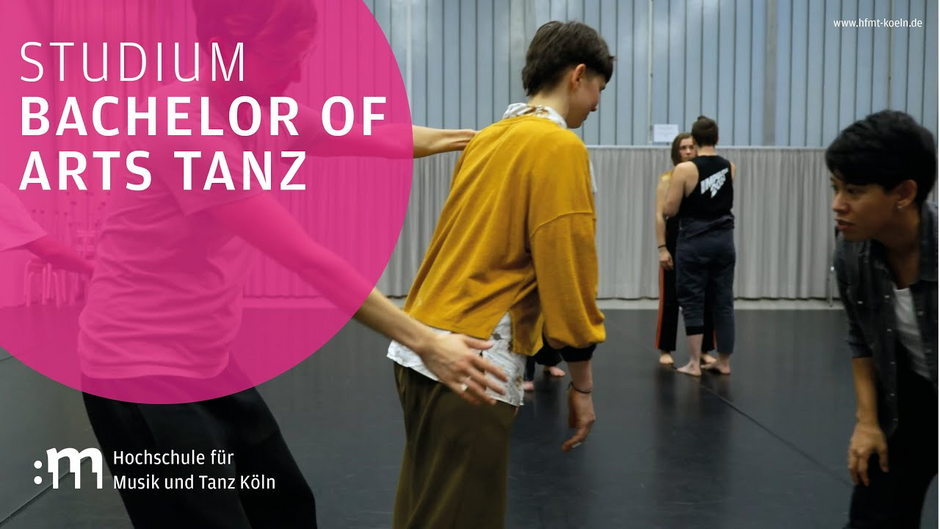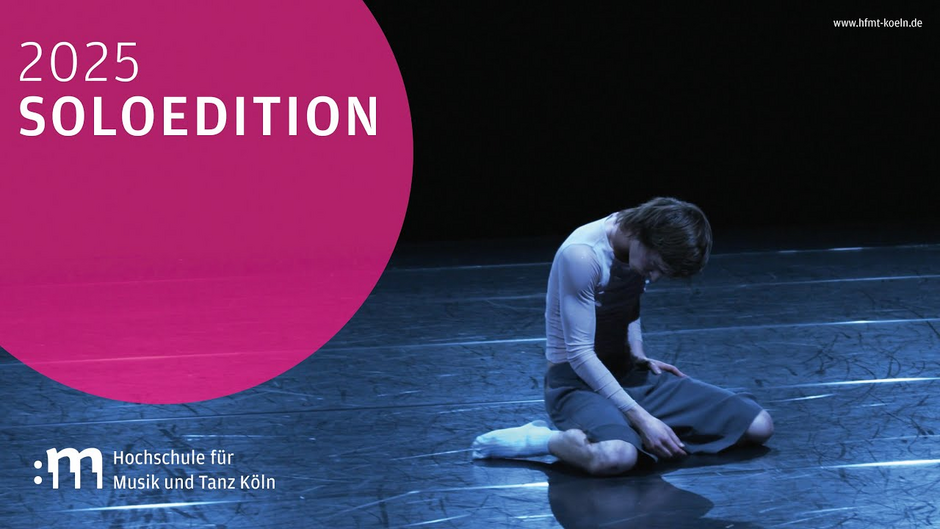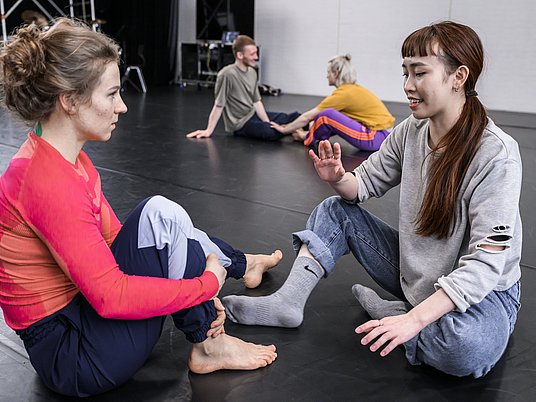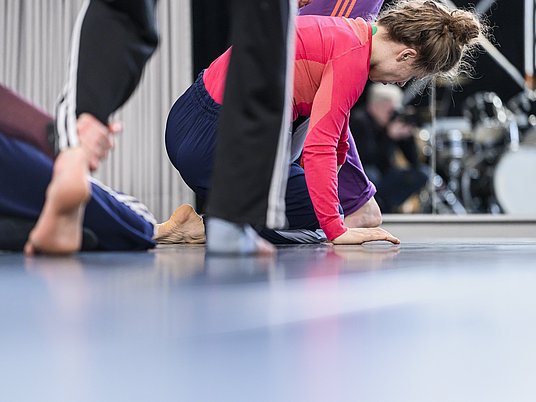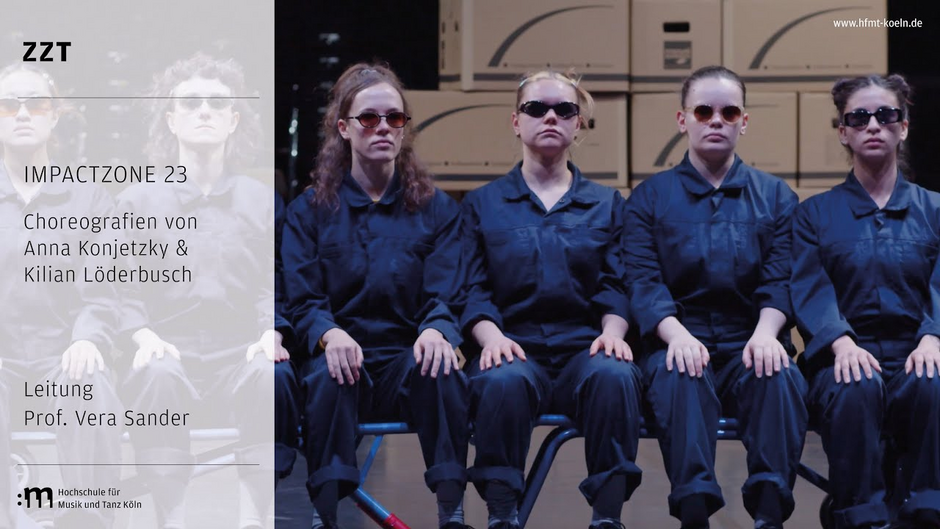Bachelor of Arts -
Dance
If you don't move, you don't move anything.
"When we work in dance, we move at the edges of the unknown. We use means of expression that are sometimes inaccessible to the conscious mind. In doing so, we discover that we receive more from our environment than we think. It depends on the state of perception that we encounter: Openness, rooted in the body and the senses, ready to follow a trail, to discover and to give space to action."
A degree in contemporary dance prepares students for the challenges of the professional field and also helps them to recognize and represent their own strengths and values. This also includes the ability to engage with others and respect diversity. This enables a learning environment that recognizes the individuality of the students and promotes their further development.
The Bachelor of Arts Dance degree program trains individual dance artists and dance mediators with their own profile. The teaching content and formats are diverse: practical and application-oriented tools are just as much a part of the course as interdisciplinary, international and intercultural aspects of dance. The aim is to enable students to advance their artistic research into physicality and movement, to position themselves in their future professional field and to be prepared for its demands.
Further information on the course structure and content can be found further down the page.
If you have any questions about the degree program, please get in touch with the responsible contact person(s).
Basic information
| Degree | Bachelor of Arts |
|---|---|
| Period of study | 8 Semester |
| Course begin | Wintersemester |
| ECTS points | 240 Credits |
| Major subjects | Tanz |
| Continuing study options | Master of Arts Mediation in Dance, Master of Arts Dance Studies |
Course structure and content
During their studies, students are given the opportunity to familiarize themselves with teaching and learning methods, procedures and approaches that are geared towards the issues and challenges of their future field of work. Not least to enable them to help shape and develop these in a forward-looking way. Students develop subject-specific and interdisciplinary skills, which they apply, reflect on and analyze both individually and collectively. They develop creative and critical ways of thinking and viewing contemporary dance practices and combine them with their own artistic practice.
Teaching formats in the Department7/ZZT are often designed to be interdisciplinary and cross-curricular. Seminars take place in the form of team teaching, among other things. In addition to group teaching, individual lessons and mentoring facilitate the individual development of students.
On the basis of contemporary training forms and ballet for contemporary dancers, practical dance tools and procedures are taught in an application-oriented and project-based manner. These enable students to conduct artistic research into physicality and movement and to position themselves in the professional field. Students deal with artistic-choreographic procedures, body discourses emphasizing diversity, participatory and interdisciplinary procedures, training practices, somatic practices and improvisational-compositional procedures. They reflect on and contextualize these with regard to their respective methods, tools and objectives and understand this input in particular as a resource for the development of their own practice.
The Department 7/ZZT is very well networked, so that project work and collaborations can be carried out at the ZZT, with the NRW dance scene and in national and international projects. Project work is seen as an integral part of the course, whereby students can also gain experience within the production-oriented areas, i.e. in dramaturgy and public relations on the one hand and in stage realization, lighting and sound on the other.
Contemporary dance practices and artistic context
In the course of their studies, students develop a dance-artistic / physically internalized practice. On the one hand, the degree program teaches well-founded tools and techniques of contemporary dance practices - contemporary dance technique, ballet for contemporary dancers, choreographic perspectives, improvisational-compositional working methods, hybrid forms of training, somatic practices and interdisciplinary working methods. This broad spectrum of different training formats enables students to acquire a well-founded dance body practice and to classify training forms in terms of their dance body and dance artistic potential.
On the other hand, formats of artistic research are examined. The focus here is particularly on interdisciplinary contexts. Students test and develop methods that provide concrete tools for discussing and negotiating artistic issues. Students work with the potential of different artistic processes and the verbalization/reflection of their artistic/research experiences. In the sense of an interdisciplinary perspective, approaches from other areas of practice and science are included in particular.
Theoretical/discursive context
In the theoretical-discursive context area, students deal with the theoretical, physical, mental, social, cultural and artistic aspects of dance as a medium. This includes, for example, dance theory and dance studies. These provide an introduction to the methods of dance studies, dance and movement analysis as well as body, gender and media theories. They convey critical references to dance history in a trans-local or global context as well as current socio-political and art and cultural studies discourses. In this module, students are encouraged to work with practical forms and formats of writing in order to further deepen the development of their "own language". The spectrum ranges from the basics of academic work and creative writing to the formulation of concepts, program texts and funding applications.
In the area of theoretical-discursive context, students are also taught reference knowledge from the fields of music theory, anatomy and body knowledge as well as group and mediation-oriented processes and work situations in dance. Insights into different concepts and approaches provide students with a set of tools for the theoretical contextualization of their artistic practice.
Professionalization
Professionalization
This part of the course enables students to specialize individually. Over the course of eight semesters, students choose courses from thematic reference fields that promote and complement their own dance-artistic practice in accordance with their dance-artistic profile. These include project management, funding structures and public relations. The courses are designed in such a way that they enable, promote and demand application-oriented practice in the professional field. Internships are explicitly encouraged. By participating and collaborating in projects in the professional field, students gain professional experience and gain an insight into specific work contexts.
Depending on their choice of courses, students can design, organize and implement projects in the area of professionalization or test and reflect on projects in the professional field. Particular attention is paid to the implementation of projects - from the concept idea to the evaluation and final presentation within the student group - with a view to the application of acquired tools and skills in a professional context. The students are accompanied by mentors.
Guests
The BA Dance program collaborates with numerous international guest lecturers and guest choreographers, including:
Priyakshi Agarwal, Ulduz Ahmadzadeh, Makisig Akin, Nora Amin, Lindy Annis, Elsa Artmann, Antonia Baehr, Fabian Barba, Regina van Berkel, Olive Bieringa, Lisa Bosbach, Nathalie Bredella, Bettina Buck, Boglárka Börcsök, Christine Bürkle, Breno Caetano, Dana Caspersen, Fatou Cissé, Anya Cloud, Maayan Danoch, Ingo Diehl, Maribeth Diggle, Anouk van Dijk, Darko Dragičević, Isabelle Drexler, Katie Duck, Tanja Erhart, Libby Farr, Emanuel Gat, Philipp Gehmacher, Rafaele Giovanola, Susanne Grau, Mariella Greil, Nuhacet Guerra, Volkhard Samuel Guist, Guy Weizman & Rony Haver, Hanna Hegenscheidt, Amy Heger, Daniela Herlyn-Kern, David Hernandez, Claudia Heu, Lisa Hinterreithner, Sangeeta Isvaran, Jason Jacobs, Eva Karczag, Lily Kiara, Henrike Kollmar, Anja Konjetzky, Narendra Kumar, Thomas Lehmen, Heike Lehmke, Nanine Linning, Patricia Carolin Mai, Russell Maliphant, Nitsan Margaliot, Sergiu Matis, Taiya Mikisch, Emi Miyoshi-Dordzillo, Maura Morales, Jennifer Muller, Britta Muntendorf, Michele Murray, Martin Nachbar, Maria Naidu, Anusha Natarajan, Adonis Nebié, Shumpei Nemoto, Sandra Noeth, Manuel Sebastian Pelmus, Ivan Perez, Antje Pfundtner, Sasha Portyannikova, Jan Pusch, Yvonne Rainer, Omar Rajeh, Otto Ramstad, Amy Raymond, Georg Reischl, Ben J. Riepe, Madeline Ritter, Jochen Roller, Ann Christin Rommen, Paula Rosolen, Xavier Le Roy, Jessica van Rueschen, Judith Sanchez Ruiz, Isabelle Schad, Yael Schnell, Stefan Schultze, Helder Seabra, Renae Catherine Shadler, Yaron Shamir, Norah Zuniga Shaw, Reut Shemesh, Sayouba Sigué, Ted Stoffer, Stephanie Thiersch, Didier Théron, Peeping Tom, Ursula Tossi, Pascal Touzeau, Andre Uerba, Julio Iglesias Ungo, Vasanth Venkatachari, Eduardo Toroja (Ultima Vez), Jasna Vinovrski, Alexandra Waiertall, Angélique Willkie, Gabriele Wittmann, Eike Wittrock, Chun-Hsien Wu, Sigal Zouk, Rasmus Ölme
Partner
Arthena Foundation/KAI 10, Brotfabrik Bonn, Cheers for Fears, Deutsches Tanzarchiv Köln, ImPulsTanz, internationale tanzmesse nrw, Internationales Tanzsolo Festival Bonn, Kolumba, KunstSalon-Stiftung, Museum Ludwig, NRW Landesbuero Tanz, Quartier am Hafen, Tanzfaktur, Tanzhaus NRW
Application and aptitude test
Applications are submitted online via the muvac platform. All information on the procedure can be found on our application page.
Admission requirements
- General higher education entrance qualification (in exceptional cases secondary school leaving certificate) or a comparable higher education entrance qualification
- Proof of a language certificate (TestDaF level 3, certificate B2 of the Goethe-Institut or certificate B2 of the Common European Framework of Reference for Languages) for non-German-speaking applicants by the end of the second semester
- Current medical certificate confirming medical suitability to study dance
- Successfully passed aptitude test
Aptitude test
- Detailed information can be found in the aptitude test regulations, in particular in the appendix for content requirements and conduct of the test.
Application deadline
- The application deadline is March 1 of each year for a course starting in the winter semester. If you have general questions about your application, please contact the Central Student Advisory Service.
Profile
The choice of profile serves the thematic and individual deepening in the field of performative practice or dance mediation and thus an individualization of one's own practice as well as application-oriented practice in the professional field. In addition to deepening their knowledge in the compulsory seminars, students develop broader perspectives on their own practice in future contexts of impact through their respective choices. In doing so, they sharpen their awareness of the specific characteristics of their individual practice. As part of projects and in cooperation with partner institutions and actors outside and within the university, they apply, reflect on and evaluate the knowledge they have acquired. The students are accompanied by mentors.
Projects
Projects
BA students in the Department7/ZZT are given the opportunity to apply the dance, dance mediation, performance and communication skills they have acquired in projects. The aim is to apply the skills acquired to date in a specific (professional) field, refine technical / artistic / communicative dance skills, (co-)design complex artistic processes, self-reflection in a professional context and an examination of current artistic dance positions.
Bachelor thesis
In the course of the 8th semester, a BA thesis is conceptualized, carried out, documented, presented and reflected upon. The topic is linked to the student's own profile and is freely chosen. A practical or theoretical focus of the BA thesis is possible. Students are supported by mentors during the preparation of the thesis.
Perspectives
The course qualifies students for entry into the professional field of dance, whether with a practical, performative or dance-mediating focus. The students' own artistic dance expression and dance body practice, which they have developed and consolidated during their studies, are just as much at their disposal as the ability to reflect on and verbalize their own and other practices and artistic research. In addition to a career as a dancer, the degree course - depending on the individualization chosen - also forms the basis for entry or further qualification in areas such as choreography, body and movement therapy, training management, teaching activities, artistic-administrative production areas, cultural management, dramaturgy and much more. The undergraduate course also qualifies students for a further Master's degree course. Last but not least, the course enables students to transfer forms of knowledge and methods from dance to other professional fields.
Course of studies and examination regulations
You can find the course of study and the examination regulations under Documents & Downloads.
Study shadowing
Prospective students have the opportunity to be part in the BA Dance course and follow everyday study life for one or two days.
In the winter semester 2024/25, it will be possible to take part in the BA Dance classes during the week of January 13–17, 2025.
If you are interested, please contact the coordinator Laura Lang. There are 4 spots in total for each semester.
Current events
Konzertsaal Köln
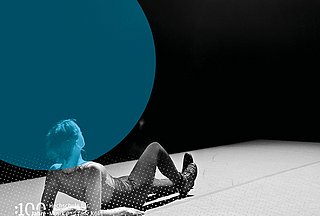
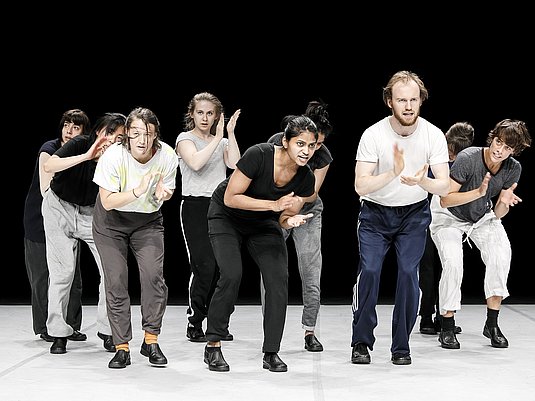
|
vera.sander@hfmt-koeln.de |
|
| Telephone |
+49 (0)221 / 28380 - 119 |
| Address |
Hochschule für Musik und Tanz Köln Turmstraße 3-5 50733 Köln |
